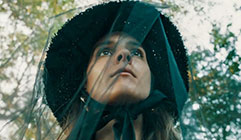|
|
|
|
Kindred Spirits
|
 |
|
At the centre of Kindred
Spirits is a fascinating character: Sadie, played by Caitlin Stasey (an
Australian actor). To some extent, she is a generic type for a domestic
thriller: the psycho sibling, with a distracted, always slightly crazed look in
her eyes and an uncontrolled libido, showing up from out of the blue, set to wreak havoc on an already unstable home-and-family
situation – think, for instance, of Drew Barrymore in Katt Shea’s still underrated Poison Ivy (1992). But there are some
intriguing kinks to Sadie.
First, there’s her wilfully childlike nature. Around
25 years old, but hanging on, forcing herself to regress. She’s giggly,
impulsive – and, in a splendid detail, ostentatiously embarrassed and
freaked-out by frank, adult sex-talk. Sadie is haunted by memory-flashbacks, in
the way of this genre, but with a complicating factor: sometimes she’s the
saviour of young Nicole (played as a sullen teen by Sasha Frolova), rescuing
her from an oncoming car in the middle of the road – or else, recalled
differently, she’s precisely the one who places the child in danger.
Why? Sadie feels a special bond with her older
sibling, Chloe (Thora Birch) – and wants to make it exclusive. Broken family
circumstances in the past have created this hothouse linkage, which has since
frayed (where Sadie disappeared to for a year, and what she did then, remain a
mystery). Chloe’s own primary bond is, naturally enough, with her daughter,
Nicole – this duo spookily resembles, in certain frames, a weird reunion of
Enid (Birch) and Rebecca (Scarlett Johansson) from the immortal Ghost World (2001). But this
mother-daughter pair are living through a difficult period of estrangement –
exacerbated by Chloe’s secret relationship with the father of Nicole’s best
teen friend.
Secrets and lies! It is on this terrain that the film
precisely draws the most remarkable characteristic of Sadie’s behaviour. She’s
the type of person – I have had the misfortune to meet a few of them in
real-life – who wins the private, one-on-one trust of every individual in a
tight-knit circle. With that trust, she extracts confessions. And she also
embroils them in secret pacts, as is the case with Chloe’s gormless, easily seduced
boyfriend (cue a bunch of oddly discreet sex-scenes in the nearby woods – where
neither of them appear to take their clothes off!).
With all that in hand, Sadie switches into her evil
work (again, I’ve been the victim of it!). Each intimacy that she extracts from
one person, she shares with the next in the circle – on the model of: “I probably
shouldn’t tell you this, but X said about you …” – which invariably leads to
the complicit comeback: “Well, let me tell you what I really think/know about X!” And, armed with that, on she goes
through the chain, betraying every confidence, turning every single character
against all the others – while remaining herself (at least for a precious
little while), in the middle, unsuspected, as everybody’s super-best buddy and
confidante. It’s a hellish intersubjective experience I’ve rarely seen captured
so well in cinema – I shuddered in recognition!
Otherwise, Kindred
Spirits is effective but fairly ordinary stuff. I admire the work of
director Lucky McKee: The Woman (2011)
is among the outstanding, too-little-known gems of the 2010s, and May (2002) showed early signs of his immense
promise. McKee’s regular collaborator, Chris Sivertson (director of the
astonishing and De Palmaesque I Know Who
Killed Me [2007]) is back on board as sole writer here. The other string to
the McKee/Sivertson bow – campy and gory teen-horror pop-cinema comedy, as
manifested in their two versions of All
Cheerleaders Die (2001 & 2013) – is less delectable to me, and it
overloads one uncharacteristically gruesome scene in Kindred Spirits involving a hole in someone’s head and a probing
finger.
Unlike The Woman,
however, Kindred Spirits does not
manage to spin its premise, thematically, into successive stages of higher and
more complex development. It clicks through the anticipated plot moves – some
of which are morbidly satisfying – to arrive at pretty much the point it
started from: families are weird, inbred, festering, closed-community units.
Which is what psychological thrillers have been telling us since (at least) the
1980s!
© Adrian Martin 15 February 2020 |
![]()